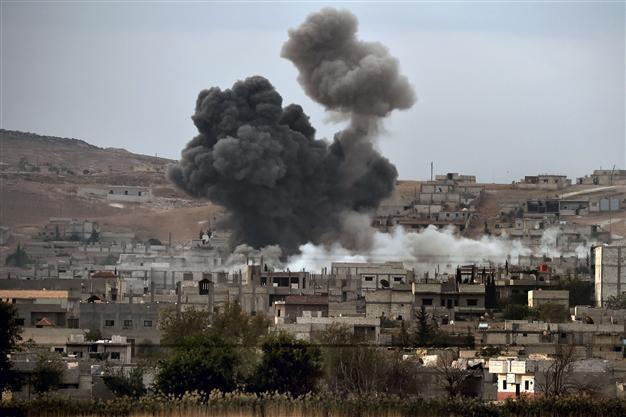War on the doorstep compounds Turkey’s economic worries
ISTANBUL/ANKARA-Reuters

Smoke rises from Kobane after a strike from the US-led coalition, seen from the Turkish-Syrian border on Oct. 14. AFP Photo
Already struggling for substantial growth after at least a year of foreign and internal turmoil, the Turkish economy could have done without an Islamic State of Iraq and the Levant (ISIL) onslaught against Syrian Kurds on Turkey’s border.
Investors who until mid-2013 saw Turkey as a relatively safe bet in a chaotic region are increasingly alarmed that it might not only be dragged into the war in Syria but also lose the hard-won prospect of peace and economic revival in its own Kurdish region.
“This is ethnic turmoil, we are very worried,” said Atilla Yeşilada, an economist with the New-York based Global Source Partners.
“Difficult days are ahead for Ankara, and investors will eventually see that reality, and will push up the political risk premium permanently.”
So far, Turkey has resisted Western and Kurdish pressure to enter Syria’s complex war by sending its tanks a few meters over the border to confront the jihadists of ISIL, who have already driven 200,000 Syrian Kurds to seek shelter in Turkey.
A peace process to end a three-decade insurgency by the Kurdistan Workers’ Party (PKK) is under severe threat.
Already, the Turkish lira has lost around 2.5 percent against the dollar since the Kobani crisis started nearly a month ago, underperforming other emerging market currencies, while Istanbul’s main share index is down around 3 percent. Foreign investors sold a net $500 million in Turkish equities in September.
“Political risks are a ticking bomb,” said Uğur Gürses, a columnist at daily Hürriyet and a former central banker. “If Kobane falls, it will trigger further domestic violence and push the dollar/lira [exchange rate] through the roof.”
Officials are already acknowledging that Turkey is entering choppy financial waters, while blaming global conditions.
Presenting their medium-term economic plan last week, Deputy Prime Minister Ali Babacan and Finance Minister Mehmet Şimsek revised down their growth forecast for this year to 3.3 percent from 4.0 percent, and for 2015 to 4 percent from 5 percent.
Gürses said growth could even sink to 2.0-2.5 percent, undermined by lira weakness that was boosting inflation and reducing domestic demand. “That will be very unpleasant for a government that is proud of high growth rates,” he said.
Reforms are neededŞimşek himself told reporters on Oct 15 that Turkey could not be satisfied with 3-4 percent growth. “With those numbers, the employment we can create is limited,” he said. “We need to jump onto a high-growth path again. And the only way to do that is to make micro-level reforms, which we will announce soon.”
After Erdoğan came to power in November 2002, Turkey averaged 7 percent growth until the financial crisis of 2008/09 triggered a recession.
But after bouncing back strongly in 2010, growth has slowed as the investment climate clouded over, long before the turmoil of the last few weeks.
Expectations grew that the U.S. Federal Reserve would reduce the availability of cheap funds, and the government took steps to dampen domestic demand as the current account deficit grew.
That deficit, seen as Turkey’s main economic weakness, has contracted somewhat, but remains near 6 percent of GDP, about twice the rate of, say, Brazil or Indonesia, although cheaper oil should provide substantial relief next year.
Meanwhile the government now projects inflation of 9.4 percent for end-2014, higher than the central bank’s latest forecast and almost twice the government’s target.
Now, the turmoil on the doorstep in Syria threatens to wreck a flagship government policy with the potential to unlock huge growth in the southeast, a region of 15 million people shut out of Turkey’s expanding prosperity by its Kurdish conflict.
“For all the Western criticism of Erdoğan, investors have long seen him as better than any previous leader in his efforts to make peace with the Kurds and open the southeast to foreign investment,” said Jonathan Friedman, Middle East analyst and associate at the Centre for Turkey Studies (CEFTUS) in London. “But the current unrest threatens to undermine that legacy.”
Plans on hold For investors in the region’s promising hydro power, mining and oil opportunities, the unrest is a potential “game-changer,” he said, adding that “companies considering new investment are putting their plans on hold.”
Even if the Kurdish peace process can be kept on track, diplomats say any Turkish role, albeit reluctant, in the fight against Islamic State could invite a terrorist attack that could devastate its tourism sector, a major source of foreign revenue.
It may all mean that Erdogan’s options are narrowing to secure the legacy he has promised: to lift Turkey from about 17th into the top 10 global economies, with a per capita income of $25,000, by 2023, the 100th anniversary of the foundation of the modern state.
After rising in leaps and bounds early in his tenure, per capita income in dollar terms has stalled at around $11,000 since 2007. Foreign direct investment peaked the same year at $22 billion, and has since hovered around $12-13 billion a year.
